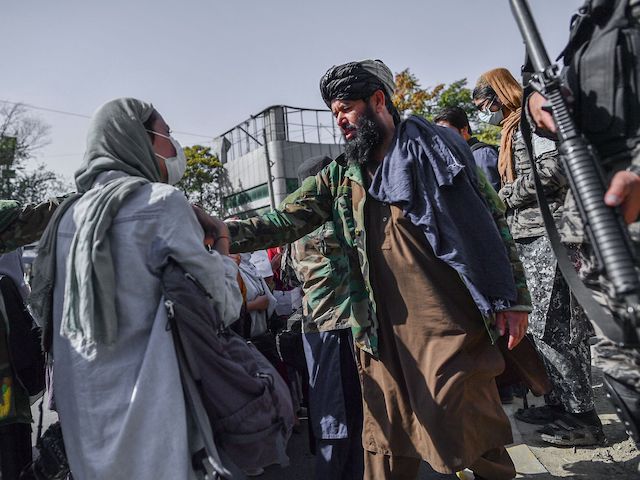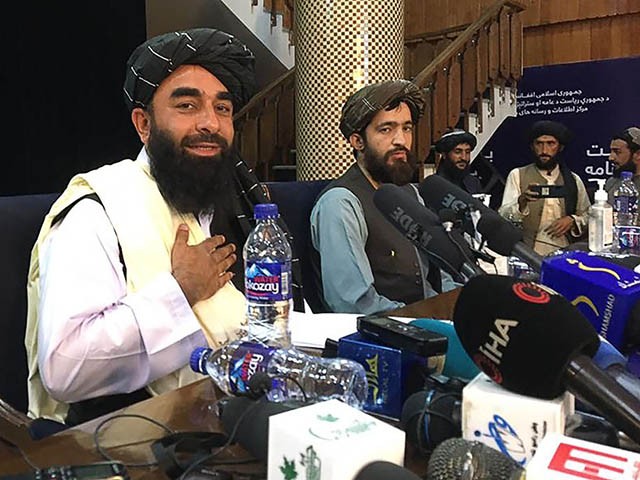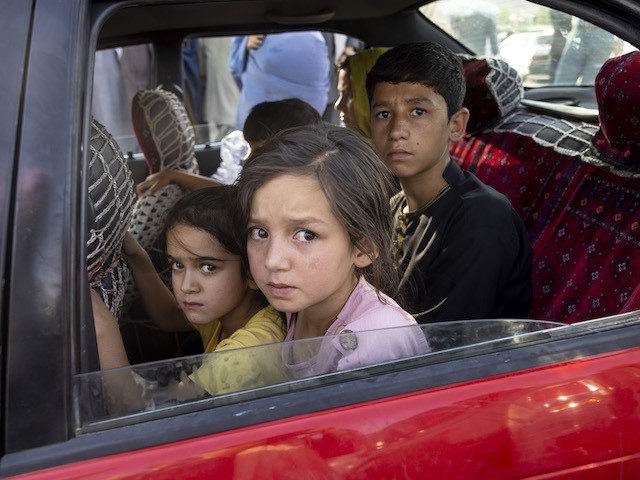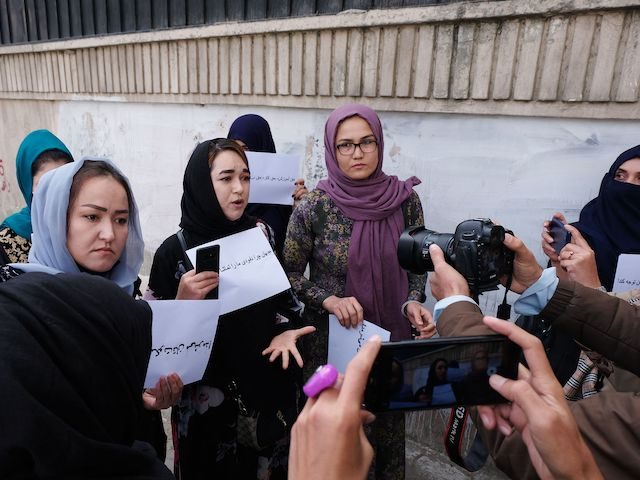Women in Kabul, Afghanistan, organized yet another protest on Tuesday demanding the Taliban terrorist organization, which currently runs the country, allow them to return to work and re-open schools for girls.
The protesters also addressed the international community – and the United Nations, in particular – demanding that self-proclaimed women’s rights advocates pressure the Taliban into adhering to the promise it made when it came to power in August that it would respect the rights of women.
The Taliban took over the country on August 15 after a nationwide conquest campaign triggered by President Joe Biden’s decision to violate an agreement predecessor Donald Trump made with the jihadists that required the latter not to attack U.S. or other foreign forces. Among the group’s first actions in power was to shut down schools and block women from education; they also banned women from workplaces and ordered all women nationwide not to leave their homes.
Afghan women have organized nearly ceaseless waves of protests, particularly in Kabul and Herat, against these measures, participating in peaceful assemblies by chanting and raising signs outlining their demands to the new regime. Taliban jihadists have attacked several of these protests despite senior Taliban leaders vowing the terrorists would not use violence against civilians.
The Kabul protest on Tuesday, according to Afghan news agency Khaama Press, differed from most of the previous assemblies in that participants demanded the United Nations act to defend their rights.
The protest took place outside of the U.N.’s Afghanistan mission headquarters, and the women reportedly demanded to meet with program leader Deborah Lyons and make their demands heard.
“The protestors said that the silence of the U.N. against the ongoing situation in Afghanistan is ‘shameful,'” Khaama reported. “The women chanted ‘rights to education, rights to work, are the fundamental rights of women’ and ‘history will be ashamed of the silence of the U.N.'”
Tolo News, an Afghan news broadcaster, reported that the women also made the case that their participation in the workforce and access to education are consistent with sharia, the Islamic law. Taliban jihadists have repeatedly asserted that they would only respect the rights for women that exist within sharia, implying that basic civic rights afforded to women in free states would remain off-limits.
“Today half of Afghanistan’s population has been removed. We are deprived of our rights,” protester Marjan Amiri told Tolo News. Another protester lamented “the international community’s silence over the situation in Afghanistan,” noting this as the central reason for the protest.
No reports surfaced of the Taliban attacking Tuesday’s protest, perhaps because it addressed the United Nations and not only the Taliban itself. A similar protest in Kabul last week in front of the Afghan Ministry of Education – on that occasion, specifically demanding the return of girls to schools – resulted in Taliban terrorists assaulting the about 20 women convened.

Taliban members stop women protesting for women’s rights in Kabul on October 21, 2021. (Bulent Kilic/AFP via Getty Images)
“Though the protest was peaceful and the Taliban allowed the protestors to walk from the ministry of education to the ministry of finance, turned violent later,” Khaama Press reported last week. “Eyewitnesses say that the Taliban fighters policing the demonstration beat a foreign and two local journalists after they were scattered.”
Women almost immediately organized protests against the Taliban following their return to power on August 15. The Taliban jihadist group regularly committed gross human rights violations against women during its rule in the 1990s, banning women from public places unless they wore a burqa, a garment that covers every inch of their bodies. In light of that history, human rights groups denounced the Taliban’s return to power as a deadly threat to women in the country. Taliban spokesmen insisted that they would give women all rights “according to the sharia,” without specifying the limits of their current interpretation of sharia.
Taliban jihadists shut down schools and banned women from offices, forcing them to return home if they approached their places of work. Terrorist spokesman Zabihullah Mujahid announced a soft ban on women in public less than two weeks into their rule.
“We are asking women to stay home at the moment,” Mujahid said at a press conference. “There are security concerns and once we have that under control, our sisters will be able to return to work.”

Taliban spokesperson Zabihullah Mujahid (L) gestures as he arrives to hold the first press conference in Kabul on August 17, 2021, following the Taliban’s takeover of Afghanistan. (Hoshang Hashimi/AFP via Getty Images)
Mujahid conceded that the Taliban itself was the root cause of those “security concerns” and asked women to give the group time to teach its members “how to deal with women.”
The international community has done little in response to the vocally expressed concerns of Afghan women. The United Nations, in particular, has established a rapport with the Taliban that has resulted in no meaningful action to defend Afghan women’s rights. A senior official within UNICEF, the U.N. children’s agency, said in August that he was “quite optimistic” the Taliban would allow girls to safely attend school and asserted UNICEF had “not had a single issue with the Taliban.”
The head of the World Food Programme (WFP), the U.N.’s Nobel-Prize-winning aid arm, met with Taliban officials in Qatar shortly after their seizure of power to discuss how to continue the WFP’s operations under the radical Islamist regime. Taliban spokesman Suhail Shaheen revealed the meeting; the WFP notably omitted publicizing the event.
The U.N. Security Council has addressed Taliban concerns through weak language in resolutions. Towards the end of October, a Security Council resolution urged the Taliban to allow “full, equal and meaningful representation of women” and had previously urged the Taliban to establish “inclusive” governance in the country.
The Secretary-General of the United Nations Antonio Guterres told the Agence France-Presse (AFP) in September that he felt the U.N. had a responsibility to “maintain a dialogue with the Taliban, where we affirm our principles directly.”

Displaced Afghan families head into Kabul from the northern provinces desperately leaving their homes behind on August 10, 2021 in Kabul, Afghanistan. (Paula Bronstein /Getty Images)
“Our duty is to extend our solidarity to a people who suffer greatly, where millions and millions risk dying of hunger,” Guterres said, offering “a dialogue with a feeling of solidarity with the Afghan people.”
Shortly thereafter, the U.N. pleaded with international donors to raise $600 million for Afghanistan, stating that the Taliban had guaranteed that the money would be used for its intended humanitarian purpose. The statement suggested the Taliban would be in control of that money as the de facto government of Afghanistan.

COMMENTS
Please let us know if you're having issues with commenting.